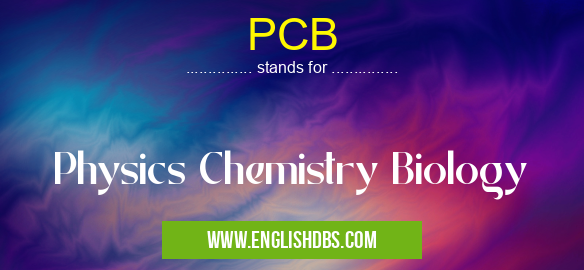What does PCB mean in PHYSICS
PCB is a widely used acronym in the field of science, particularly in the context of education and research. It stands for Physics, Chemistry, and Biology, which represent the three core disciplines that constitute the natural sciences.

PCB meaning in Physics in Academic & Science
PCB mostly used in an acronym Physics in Category Academic & Science that means Physics Chemistry Biology
Shorthand: PCB,
Full Form: Physics Chemistry Biology
For more information of "Physics Chemistry Biology", see the section below.
PCB Meaning in SCIENCE
PCB holds significant importance in science education as it encompasses the study of:
- Physics: Explores the fundamental laws governing matter, energy, and interactions in the universe.
- Chemistry: Delves into the composition, structure, and properties of matter, as well as the chemical reactions that occur between substances.
- Biology: Investigates living organisms, their structure, function, growth, and evolution, along with the intricate interactions within ecosystems.
PCB Full Form
- P - Physics: Focuses on concepts such as motion, forces, energy, waves, electricity, and magnetism.
- C - Chemistry: Emphasizes the understanding of atomic structure, chemical bonding, reactions, thermodynamics, and organic chemistry.
- B - Biology: Covers topics like cell structure, genetics, evolution, ecology, and human biology.
What does PCB Stand for?
In summary, PCB stands for Physics, Chemistry, and Biology, representing the three essential pillars of scientific knowledge. These disciplines provide a comprehensive understanding of the natural world, from the smallest particles to the largest ecosystems.
Essential Questions and Answers on Physics Chemistry Biology in "SCIENCE»PHYSICS"
What is PCB?
PCB stands for Physics, Chemistry, and Biology, which are foundational science subjects that study the physical world, chemical properties, and life processes, respectively.
What are the key concepts in Physics?
Physics deals with fundamental concepts such as motion, energy, force, waves, and matter. It explores mechanics, electricity, magnetism, heat, and quantum physics.
What is the focus of Chemistry?
Chemistry investigates the composition, properties, and reactions of matter. It studies elements, compounds, chemical bonding, and processes like acid-base reactions, redox reactions, and organic chemistry.
What does Biology cover?
Biology encompasses the study of life in all its forms. It explores cell biology, genetics, ecology, evolution, and diverse organisms, from microorganisms to plants and animals.
What is the importance of PCB?
PCB subjects provide a comprehensive understanding of the natural world, enabling us to make informed decisions, develop technologies, solve problems, and appreciate the interconnectedness of life.
How can I excel in PCB?
To excel in PCB, it's essential to:
- Develop a strong foundation in each subject.
- Engage in active learning through experiments, projects, and discussions.
- Practice problem-solving and critical thinking.
- Seek guidance from teachers or tutors when needed.
- Stay curious and explore the world around you.
What career opportunities are available for PCB students?
PCB students have a wide range of career options in fields such as medicine, engineering, biotechnology, research, environmental science, education, and many more.
Final Words: The acronym PCB plays a crucial role in science education and research, highlighting the interconnectedness of the three core disciplines: Physics, Chemistry, and Biology. By studying these subjects together, students and scientists gain a holistic perspective on the natural world, enabling them to explore complex phenomena and develop innovative solutions to real-world problems.
PCB also stands for: |
|
| All stands for PCB |
